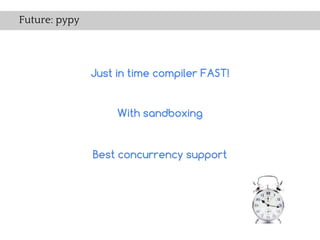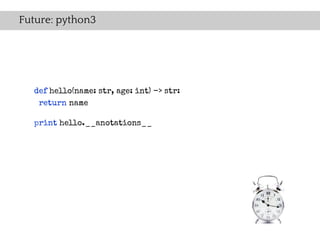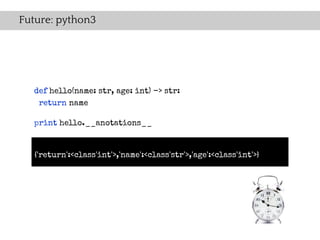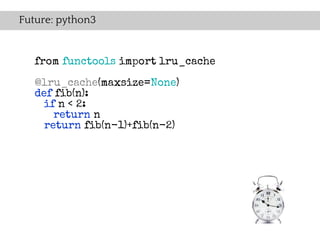The document discusses various Python concepts including:
1. The Zen of Python principles for writing beautiful, readable code.
2. Types and objects, including how variables are assigned by reference vs value.
3. Reflection capabilities like accessing an object's attributes, methods, and bytecode.
4. Context managers and how the 'with' statement provides a cleaner interface than try/finally blocks.
5. Decorators for modifying functions and methods.
6. List comprehensions and generators for compactly iterating over sequences.
7. Operator overloading for custom number and container types.
8. Class factories including properties, static methods, and inheritance hierarchies.


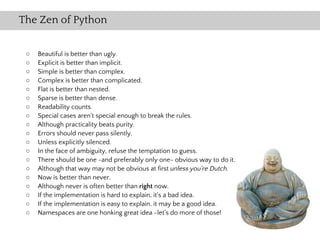

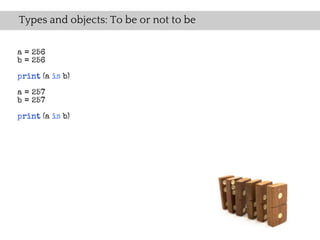
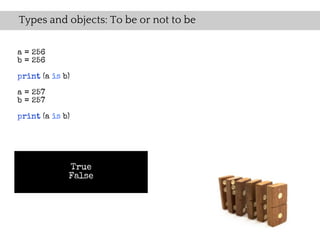
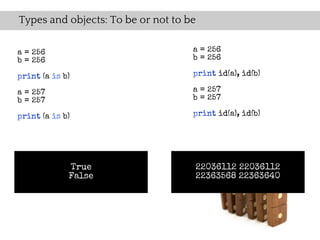
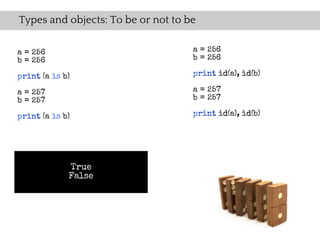
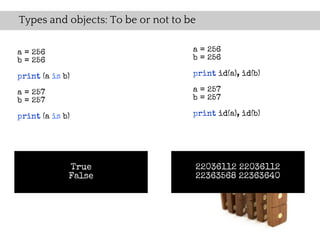
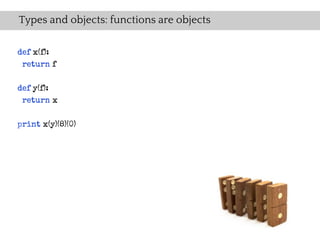
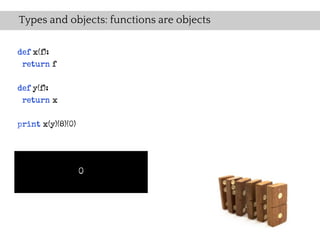
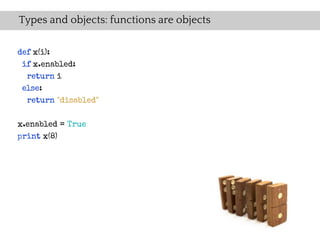
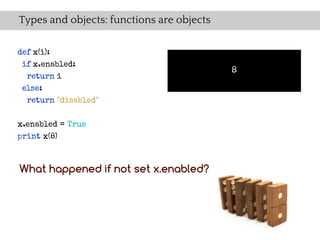
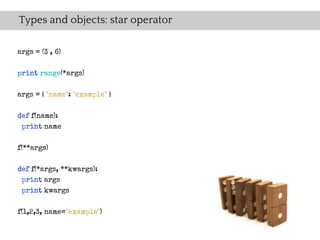
![Types and objects: star operator
args = (3 , 6)
[3, 4, 5]
example
print range(*args) (1, 2, 3)
{'name': 'example'}
args = { "name": "example" }
def f(name):
print name
f(**args)
def f(*args, **kwargs):
print args
print kwargs
f(1,2,3, name="example")](https://image.slidesharecdn.com/pythonspeleology-130405101839-phpapp01/85/Python-speleology-15-320.jpg)

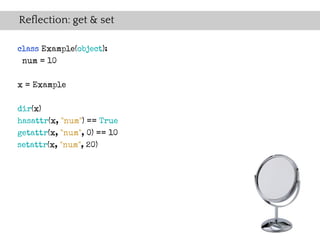
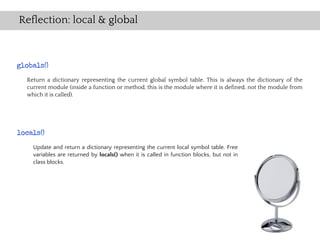
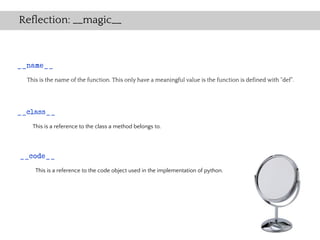
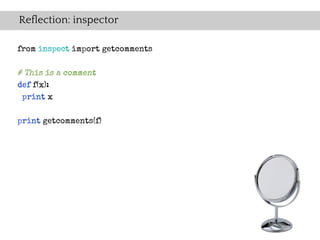
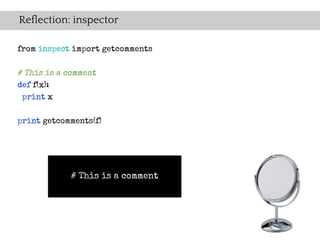
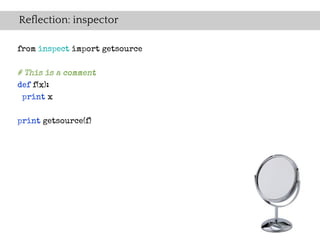
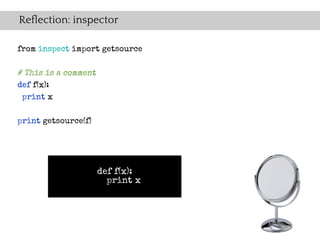
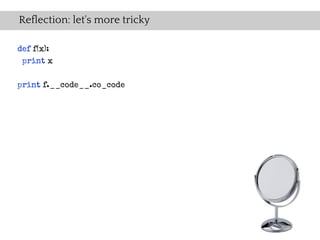
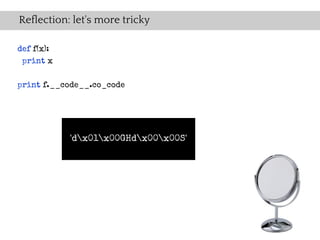
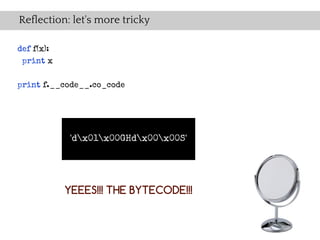

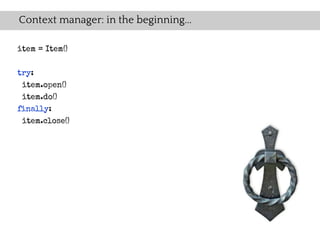
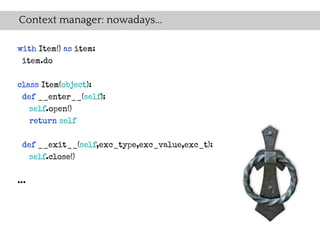
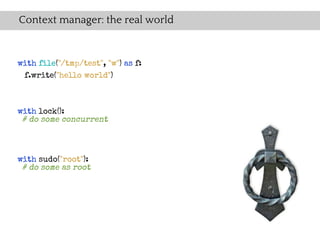

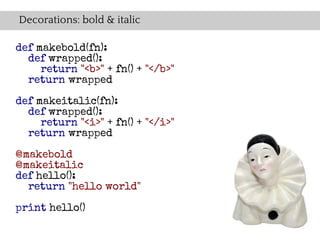
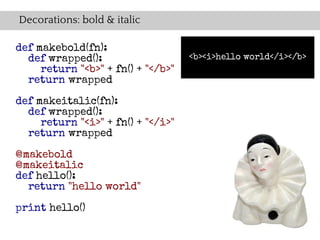
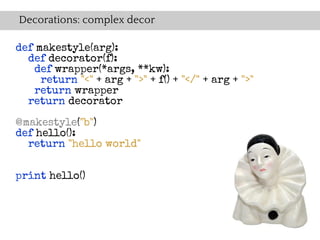
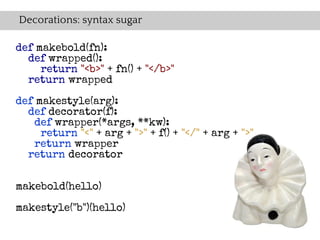

![Iterations: comprehesions
squares = []
for x in range(10):
squares.append(x**2)
squares = [x**2 for x in range(10)]
[(x, y) for x in [1,2,3] for y in [3,1,4] if x != y]
{ (k,v) for k,v in [(1,2)] }](https://image.slidesharecdn.com/pythonspeleology-130405101839-phpapp01/85/Python-speleology-37-320.jpg)
![Iterations: comprehesions
squares = []
for x in range(10):
squares.append(x**2)
squares = [x**2 for x in range(10)]
[(x, y) for x in [1,2,3] for y in [3,1,4] if x != y]
{ (k,v) for k,v in [(1,2)] }
SET NOT DICT!](https://image.slidesharecdn.com/pythonspeleology-130405101839-phpapp01/85/Python-speleology-38-320.jpg)
![Iterations: comprehesions
squares = []
for x in range(10):
squares.append(x**2)
squares = [x**2 for x in range(10)]
[(x, y) for x in [1,2,3] for y in [3,1,4] if x != y]
{ (k,v) for k,v in [(1,2)] }
SET NOT DICT!
{ k:v for k,v in [(1,2)] }](https://image.slidesharecdn.com/pythonspeleology-130405101839-phpapp01/85/Python-speleology-39-320.jpg)
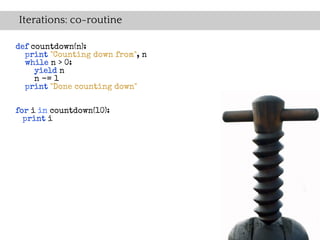
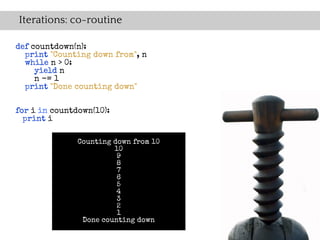
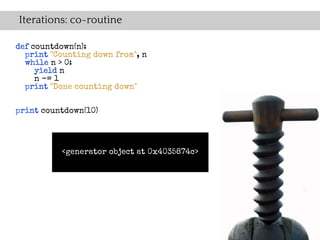

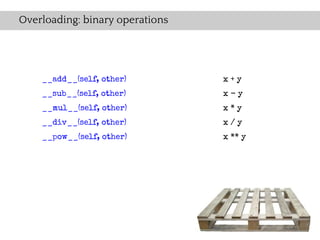
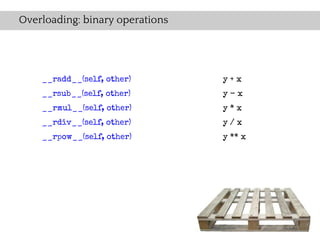
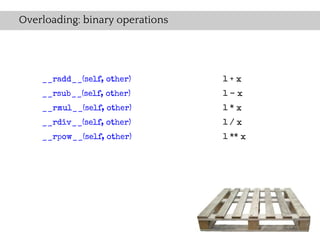
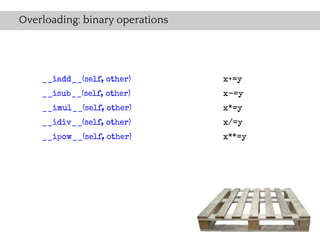
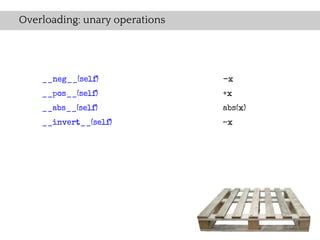
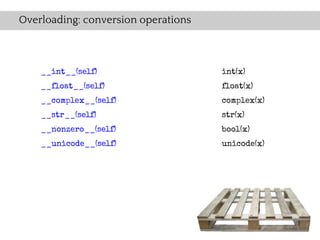
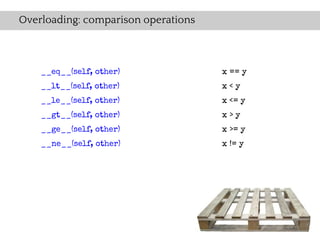
![Overloading: containers
__contains__(self, other) y in x
__getitem__(self, other) x[y]
__setitem__(self, other,value) x[y] = z
__delitem__(self, other) del x[y]
__len__(self) len(x)
__reversed__(self) reversed(x)
__iter__(self) iter(x)](https://image.slidesharecdn.com/pythonspeleology-130405101839-phpapp01/85/Python-speleology-51-320.jpg)

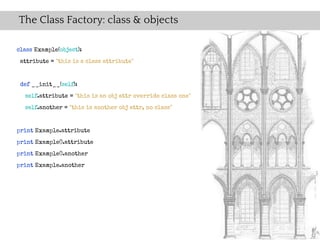
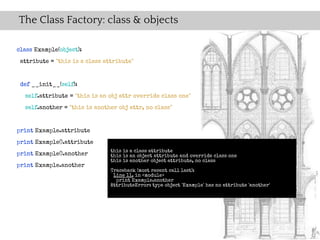
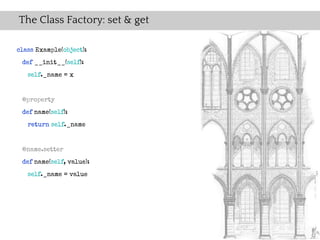

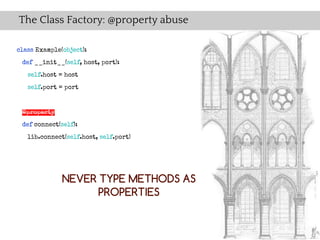
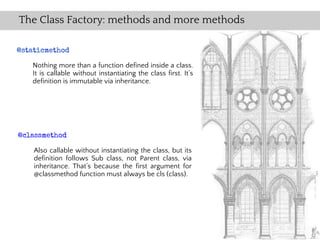
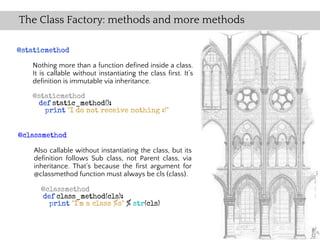
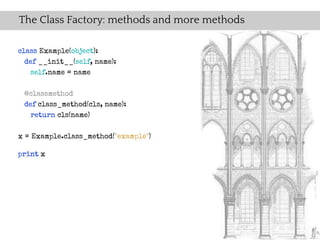
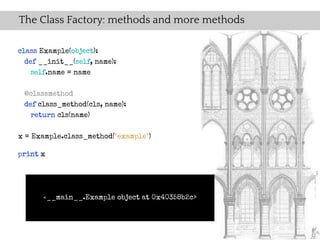
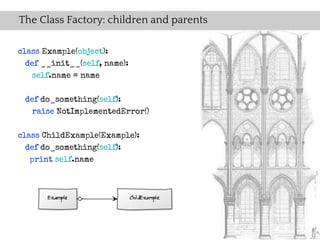
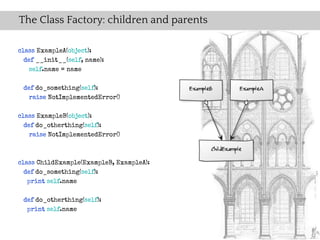
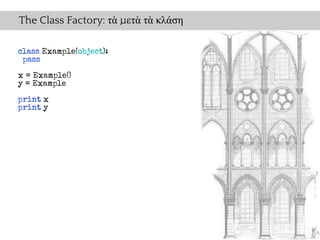
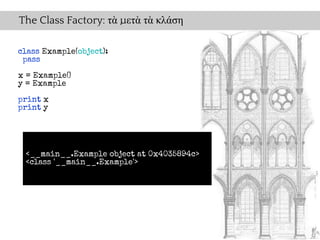
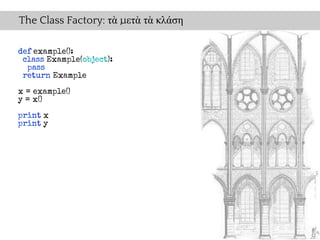
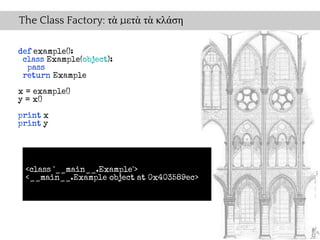
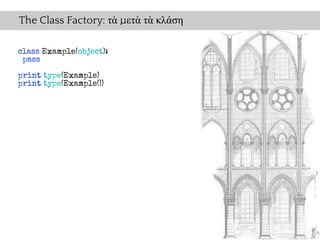
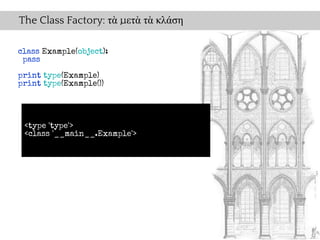
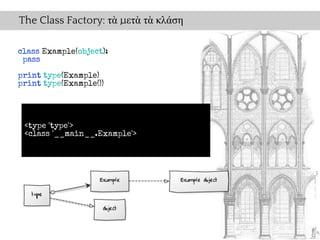
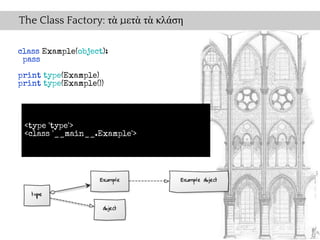
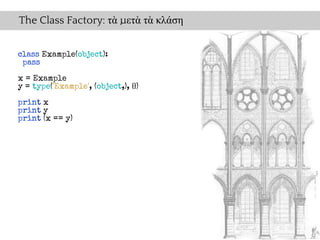
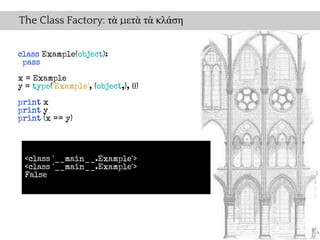
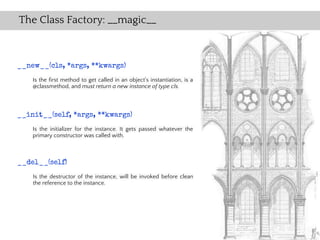
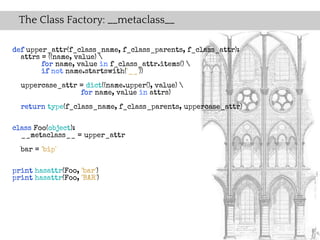
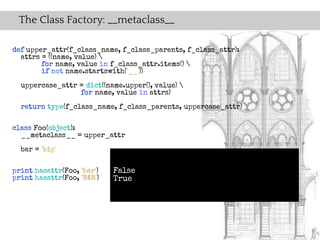

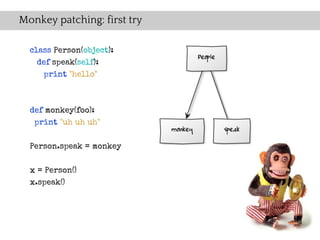
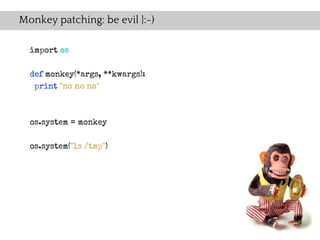
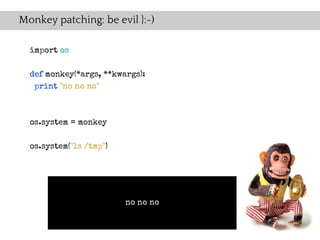

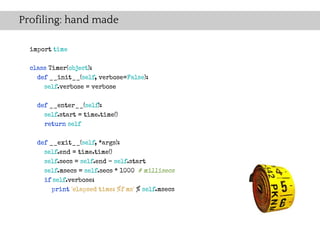
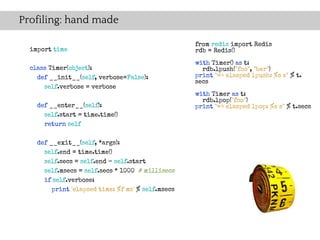
![Profiling: profile & cProfile
try:
import cProfile as profile
except ImportError:
import profile
def fib(n):
if n == 0:
return 0
elif n == 1:
return 1
else:
return fib(n-1) + fib(n-2)
def fib_seq(n):
seq = [ ]
if n > 0:
seq.extend(fib_seq(n-1))
seq.append(fib(n))
return seq
profile.run('print fib_seq(6); print')](https://image.slidesharecdn.com/pythonspeleology-130405101839-phpapp01/85/Python-speleology-84-320.jpg)
![Profiling: profile & cProfile
try:
import cProfile as profile
except ImportError:
import profile
[0, 1, 1, 2, 3, 5, 8, 13, 21, 34, 55, 89, 144, 233, 377, 610, 987, 1597, 2584, 4181, 6765]
57356 function calls (66 primitive calls) in 0.746 CPU seconds
def fib(n):
if n == 0: standard name
Ordered by:
return 0
ncalls tottime percall cumtime percall filename:lineno(function)
21 0.000 0.000 0.000 0.000 :0(append)
elif n == 1:
20 0.000 0.000 0.000 0.000 :0(extend)
return 1
1 0.001 0.001 0.001 0.001 :0(setprofile)
else: 0.000 0.000 0.744 0.744 <string>:1(<module>)
1
1 0.000 0.000 0.746 0.746 profile:0(print fib_seq(20); print)
return fib(n-1) + 0.000
0 0.000 fib(n-2) profile:0(profiler)
57291/21 0.743 0.000 0.743 0.035 profile_fibonacci_raw.py:13(fib)
21/1 0.001 0.000 0.744 0.744 profile_fibonacci_raw.py:22(fib_seq)
def fib_seq(n):
seq = [ ]
if n > 0:
seq.extend(fib_seq(n-1))
seq.append(fib(n))
return seq
profile.run('print fib_seq(6); print')](https://image.slidesharecdn.com/pythonspeleology-130405101839-phpapp01/85/Python-speleology-85-320.jpg)

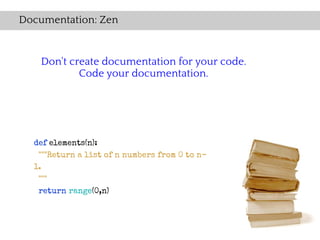
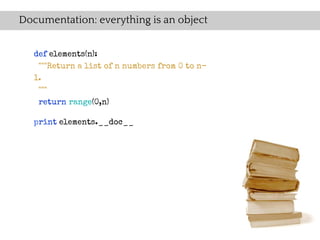
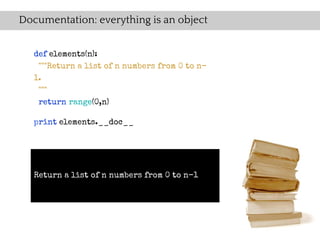
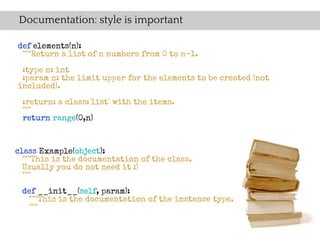

![Documentation: Bonus... abuse the doc
class Command(object):
"""Undocumented command
"""
class ListCommand(Command):
"""List command.
"""
def show_help(command):
cmd = getattr(globals()[__name__], "%sCommand" % command,
None)
if cmd is None:
return "Invalid command"
else:
return cmd.__doc__
print show_help("List")](https://image.slidesharecdn.com/pythonspeleology-130405101839-phpapp01/85/Python-speleology-92-320.jpg)

